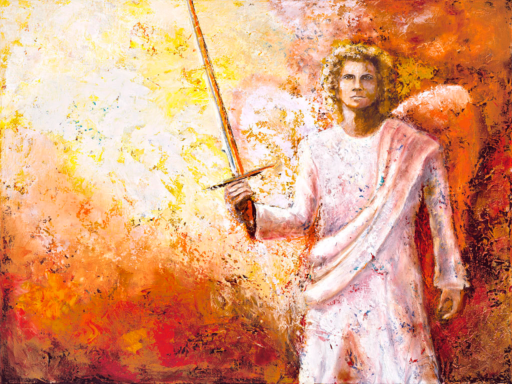Matthew Porto’s debut poetry volume, Moon Grammar (just published by Slant Books), is an intriguing collection. In three Parts, titled “The Angel,” “The Wanderer,” and “Endings,” Porto engages biblical narratives, travels in space and time, and finalities.
The first Part’s biblical stories are mostly from the Hebrew Scriptures—or, I should say, tangential to these stories, since Porto invents some angles of his own. For instance, we get, in “The Angel After Eden,” a picture of Adam and Eve after their expulsion from the garden—from the angel’s viewpoint:
When I saw what He’d made in the garden, I felt I’d fallen on my own sword— harsh light passed through the very center of my body. I was one of the few of my kind who loved them— though they were pathetic: huddled under a terebinth in the empty Crescent, Eve exhausted and suddenly aware she was pregnant, Adam wiping her forehead with his sweaty palm.
The angel is the speaker in many of Part One’s poems. In Porto’s interview with Slant, he explains the significance of the angel for him: “It stands for experiences beyond my comprehension—those life-affirming moments that really keep us going: a great conversation in which you seem to be truly in one another’s heads; a certain cast of light on tall trees; the moment when music and landscape become one. Our lives contain these moments, but how to talk or write about them? The angel was my answer to that.”
So, on the mystery of childbirth (also from “The Angel After Eden”):
When the baby tore through her, I was sure she would die. Time and its retinue looked on from one bank, I from the other. She lived, and the child, too. Time was, as always, indifferent, blank-faced. What I felt was pride, as if I had made something, having gathered the words to describe their image. My sword fell to my side, its flame quenched.
Here is surely a “life-affirming moment”—with “time” watching from one side, eternity (as the angel) from the other.
Of all the biblical narratives, I doubt any has been treated poetically more often than the Annunciation. So it takes some courage for another poet to take it on. Yet Matthew Porto is undaunted by the challenge. In the longest poem of Part I, he reimagines this scene from (of course) the angel Gabriel’s viewpoint, expanding on the biblical text.
Even before I came through the door, I heard her half-collapse. The girl must have heard the rush of wings as I landed on the threshold. But she did not fall.… I’d felt what she was feeling once: the time He took up a handful of earth and made man in Eden— we all stood in a row looking sidelong at one another, each becoming aware that something with wings was growing inside of us and beginning to stir.
After this inventive imaging of the angelic cohort observing the Creation, Porto’s Gabriel continues by extolling angels’ usefulness to God:
We encircle His throne when He feels loneliness or despair— …The only way to comfort Him is to project calm. It’s what we do best. (That, and unprompted, unending exultation.)
Finally the poem gets close to the biblical account:
She spoke first. Her voice was lily-soft, but her eyes—narrowing to question, widening with each answer— almost made me forget my purpose.
Then back out to the angel’s embellishments:
She marveled at my reflective garments. She asked about the pain of childbirth, and Eve. And about my wings, whether it hurt when they beat (at this she ran her fingers through them). That’s when I understood, for the first time, why He’d chosen her.
The whole poem (and there is much more: fifty-nine lines in all) uniquely and engagingly enlivens the biblical Annunciation.
The title of Moon Grammar’s second Part, “The Wanderer,” has two referents. One is to Porto’s own wanderings (his travels in Greece, Venice, New Mexico, and Vermont); the other to the Part’s final poem, his rendition of the tenth century Anglo-Saxon poem titled “The Wanderer.”
Two of the Greece poems focus on a ram’s skull that the travelers came across in (of all places) an olive tree. The skull gives them the creeps (alliteratively conveyed):
At the lipless mouth, our legs go to jelly; branches click against the skull, the nostrils’ twin water drops hang, floating fossils out of time, fruit of olive underbelly.
Then in “Venice Nocturne,” the travelers
pause to rest on the Calle de la Fenice… Pigeons stir the close air, and we recall the old women shuffling into Santa Maria dei Miracoli that morning. Now we picture them, hair colorless as dusty glass, settling into bed, or turning, with skeletal fingers, the charred knob of a stove to quiet the kettle; they wrinkle a song into the dark—su le vestigia degli antichi padri—
—and I smile at Porto’s delightfully unexpected word choices: hair like “dusty glass”; the old women’s “skeletal fingers”; and how they “wrinkle” a song.
In Moon Garden’s short final Part, titled “Endings,” Porto includes poems on various kinds of closures. There’s “Grief,” defined with this startling image:
It is, like antlers, a misshapen thing: thorned on one end, on the other blunt as the knot in a trunk that remembers a lost branch.
And Porto’s angel returns, but only to bid us goodbye. Can an angel die? The poem (“The Angel’s End”) is equivocal on this. At the start:
Was I already dead when my superior appeared to claim me? I can’t answer that, even from where I am now, in the beyond, neither dead nor alive
But then his “superior” reassures him:
He bent tenderly, called me “Little Jay,” cradled my head and patronized me, assuring me of our shared immortality, of the impossibility of death for His favored.
Yet then another twist. To our surprise, our angel bleeds:
As though answering him, the blood pooling under my back crested over my shoulder just then and the deep red darkened his bright eyes.
And with another twist, we’re brought to this haunting ending:
He was my last link to heaven, and he left me there in that lane, where market awnings waved in the breeze over baskets of heaped fruit, where merchants called out answers, bright jewels extinguished in their fists.
Just to clarify: the poems of Moon Grammar are not about angels; they’re about the complexities of our human life. To recall Porto’s comment above about his use of the angel: “It stands for experiences beyond my comprehension.” The marvel of these poems is that they find language to make these experiences comprehensible. All in all, Moon Grammar‘s poems give us a unique entry into what human life is about: its astonishments, its darknesses, its mysteries.
Peggy Rosenthal has a PhD in English Literature. Her first published book was Words and Values, a close reading of popular language. Since then she has published widely on the spirituality of poetry, in periodicals such as America, The Christian Century, and Image, and in books that can be found here.





